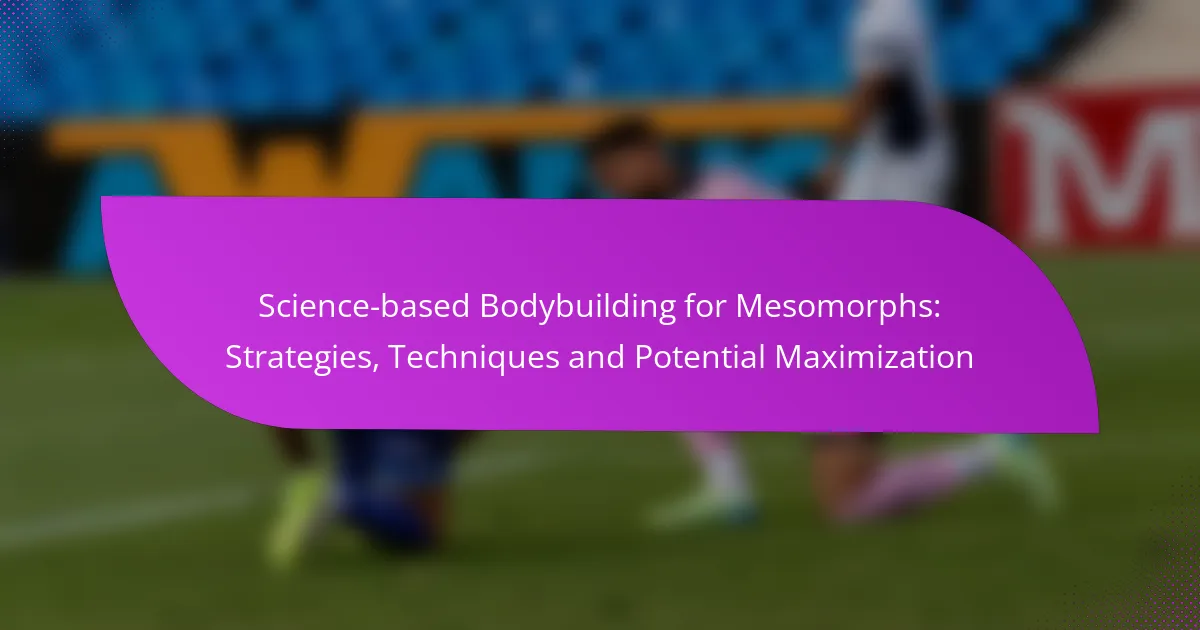Youth science-based bodybuilding emphasizes the importance of age-appropriate training guidelines, balanced nutrition, and safety measures to support healthy development. By incorporating supervised workouts and tailored nutritional strategies, young athletes can enhance their performance while minimizing the risk of injury. Understanding the principles of safe training and proper nutrition is essential for fostering a lifelong positive attitude towards fitness.

What Are the Best Training Guidelines for Youth Bodybuilding?
The best training guidelines for youth bodybuilding focus on age-appropriate exercises, balanced workout frequency, and proper supervision. These elements help ensure safety, promote healthy development, and foster a positive attitude towards fitness.
Age-appropriate exercises
Youth bodybuilding should prioritize exercises that are suitable for their developmental stage. Bodyweight exercises, such as push-ups, squats, and lunges, are excellent starting points. As they progress, incorporating resistance bands or light weights can enhance strength without risking injury.
It’s crucial to avoid heavy lifting or complex movements that require advanced technique, as these can lead to injuries. Focus on functional movements that promote overall fitness and coordination.
Frequency and duration of workouts
For youth, workouts should typically be scheduled 2 to 4 times per week, with each session lasting about 30 to 60 minutes. This frequency allows for adequate recovery while promoting consistent progress. Sessions can include a mix of strength training, cardiovascular activities, and flexibility exercises.
Balancing workout intensity and rest is essential. Youth should not train the same muscle groups on consecutive days to prevent overuse injuries.
Importance of warm-up and cool-down
Warm-up and cool-down routines are vital components of any youth bodybuilding program. A proper warm-up, lasting around 5 to 10 minutes, increases blood flow and prepares the muscles for exercise. Activities like dynamic stretching or light aerobic exercises are effective.
Similarly, cooling down after workouts helps reduce muscle soreness and aids recovery. This can involve static stretching and deep breathing exercises, lasting another 5 to 10 minutes.
Supervision and coaching recommendations
Supervision is critical in youth bodybuilding to ensure safety and proper technique. Ideally, workouts should be guided by a qualified coach or trainer familiar with youth fitness. They can provide personalized instruction and monitor progress.
Parents or guardians should also be involved, encouraging their children and reinforcing the importance of safety and proper form. This support can enhance motivation and adherence to the training program.
Safety measures during training
Implementing safety measures is essential in youth bodybuilding. Always ensure that the training environment is free of hazards and that equipment is age-appropriate and well-maintained. Youth should be educated on the importance of listening to their bodies and recognizing signs of fatigue or discomfort.
Encouraging hydration before, during, and after workouts is also crucial. Youth should be reminded to take breaks as needed and to avoid competing with peers, focusing instead on personal progress and enjoyment of the activity.

What Nutritional Strategies Support Youth Bodybuilding?
Nutritional strategies for youth bodybuilding focus on providing adequate energy and nutrients to support growth, recovery, and performance. A balanced approach to macronutrients, hydration, meal timing, and careful consideration of supplements is essential for young athletes.
Balanced macronutrient intake
A balanced macronutrient intake is crucial for youth bodybuilders to fuel their workouts and support muscle growth. Generally, a diet should consist of approximately 50-60% carbohydrates, 15-20% protein, and 25-30% fats. For example, a daily intake of 2,500 calories might include around 300-375 grams of carbohydrates, 90-125 grams of protein, and 70-85 grams of fat.
Young athletes should prioritize whole foods such as lean meats, whole grains, fruits, vegetables, and healthy fats. These foods provide essential vitamins and minerals that support overall health and performance.
Hydration guidelines
Hydration is vital for maintaining performance and preventing fatigue during workouts. Youth bodybuilders should aim for at least 2-3 liters of water daily, adjusting based on activity level and climate. A good rule of thumb is to drink about 500-600 ml of water 2-3 hours before exercise and another 200-300 ml right before starting.
During workouts, sipping water every 15-20 minutes can help maintain hydration levels. After exercise, replenishing fluids with water or electrolyte drinks is important, especially if the workout was intense or lasted longer than an hour.
Meal timing and frequency
Meal timing and frequency can significantly impact energy levels and recovery for young bodybuilders. Eating 4-6 smaller meals throughout the day helps maintain energy and nutrient availability. Each meal should ideally contain a mix of carbohydrates and protein to support muscle repair and growth.
Consuming a balanced meal or snack within 30-60 minutes post-workout can enhance recovery. This meal should include protein sources like chicken or yogurt and carbohydrates such as rice or fruits to replenish glycogen stores.
Supplements for young athletes
While whole foods should be the primary source of nutrients, some supplements may benefit young athletes under professional guidance. Common supplements include protein powders, creatine, and branched-chain amino acids (BCAAs). However, it is crucial to consult with a healthcare provider or a sports nutritionist before introducing any supplements.
Young athletes should be cautious of the supplement market, as not all products are safe or effective. Prioritize obtaining nutrients from a well-rounded diet, and use supplements only to fill specific gaps when necessary.

How to Ensure Safety in Youth Bodybuilding?
Ensuring safety in youth bodybuilding involves understanding physical development, recognizing signs of overtraining, and implementing injury prevention techniques. By focusing on these areas, young athletes can engage in bodybuilding safely and effectively.
Understanding growth plate considerations
Growth plates are areas of developing cartilage tissue near the ends of long bones in children and adolescents. These plates are crucial for bone growth and can be vulnerable to injury during intense physical activities, including bodybuilding. It is essential to avoid heavy lifting and high-impact exercises that may stress these areas.
Young bodybuilders should prioritize form and technique over lifting heavy weights. Using lighter weights with higher repetitions can help build strength without risking damage to growth plates. Consulting with a qualified coach can ensure that exercises are appropriate for their developmental stage.
Recognizing signs of overtraining
Overtraining occurs when the body is subjected to excessive training without adequate recovery, leading to fatigue and decreased performance. Signs include persistent muscle soreness, irritability, sleep disturbances, and a decline in strength or endurance. Monitoring these symptoms is vital for maintaining health.
To prevent overtraining, youth athletes should incorporate rest days into their routines and ensure they get sufficient sleep. A balanced training program that includes varied activities can help manage stress on the body and promote recovery.
Injury prevention techniques
Injury prevention in youth bodybuilding involves a combination of proper warm-up, technique, and recovery strategies. Warm-up exercises should include dynamic stretches and light aerobic activities to prepare the muscles and joints for more intense workouts. This can reduce the risk of strains and sprains.
Additionally, using appropriate equipment, such as supportive footwear and weightlifting belts, can enhance safety. Educating young athletes about proper lifting techniques and encouraging them to listen to their bodies can further minimize the risk of injuries during training sessions.

What Are the Psychological Benefits of Youth Bodybuilding?
Youth bodybuilding offers significant psychological benefits, including enhanced self-esteem and improved mental focus. Engaging in structured physical activity helps young individuals develop a positive self-image and cultivate essential life skills.
Boosting self-esteem and confidence
Bodybuilding can dramatically boost self-esteem and confidence in youth. As they see physical improvements and achieve fitness goals, young bodybuilders often experience a sense of accomplishment that translates into other areas of their lives.
Participating in bodybuilding can also foster a supportive community, where encouragement from peers and coaches reinforces positive self-perception. This social aspect can be particularly beneficial for adolescents navigating the challenges of growing up.
Developing discipline and focus
Bodybuilding requires consistent training and a commitment to nutrition, which helps youth develop discipline and focus. Following a structured workout routine and adhering to dietary guidelines teaches young individuals the value of hard work and perseverance.
Setting and achieving fitness goals, whether it’s lifting a certain weight or completing a specific number of repetitions, cultivates a mindset geared towards success. This discipline can extend beyond the gym, positively impacting academic performance and personal relationships.

What Are the Legal and Ethical Considerations?
Legal and ethical considerations in youth science-based bodybuilding focus on safety, health regulations, and the moral implications of training young individuals. It’s crucial to ensure that practices align with established guidelines to protect the well-being of young athletes.
BODY REQUIREMENTS
Body requirements for youth bodybuilding emphasize the importance of age-appropriate training and nutrition. Young individuals should focus on developing strength and technique rather than lifting heavy weights. This approach reduces the risk of injury and promotes healthy growth.
Nutrition plays a vital role in meeting body requirements. A balanced diet rich in protein, carbohydrates, and healthy fats is essential for muscle development and overall health. Young bodybuilders should aim for meals that include lean meats, whole grains, fruits, and vegetables to support their training.
DEPTH & COVERAGE
Depth and coverage in youth bodybuilding training should prioritize gradual progression and skill development. Programs should be designed to enhance strength, flexibility, and endurance while avoiding excessive strain. Incorporating a variety of exercises can help maintain interest and prevent burnout.
It’s important to monitor the intensity and volume of workouts. Youth athletes should engage in training sessions that last no longer than 60-90 minutes, with a focus on proper form and technique. Regular assessments can help ensure that the training remains suitable for their developmental stage.



